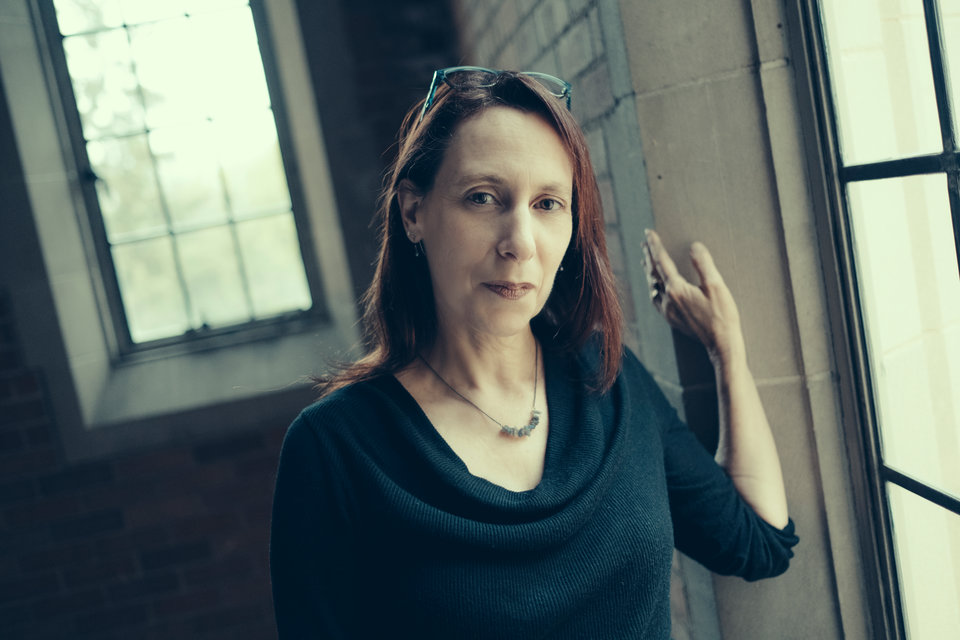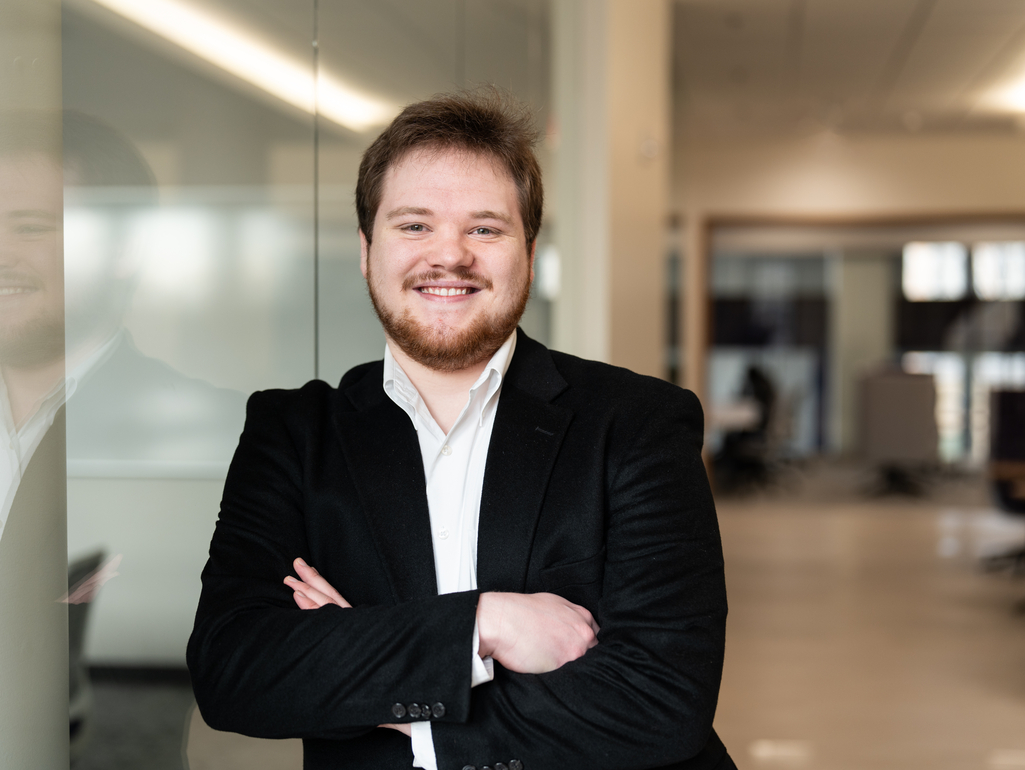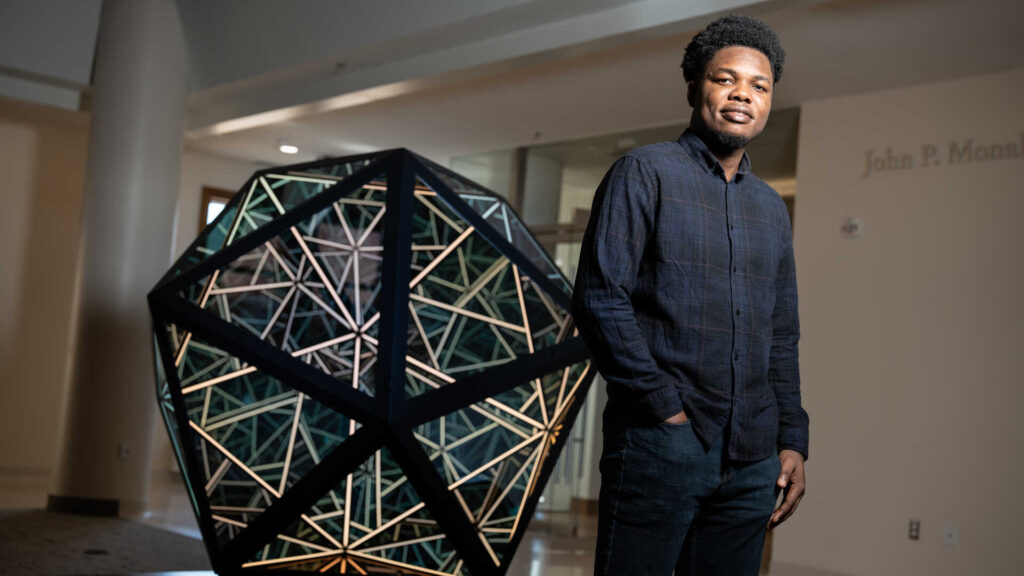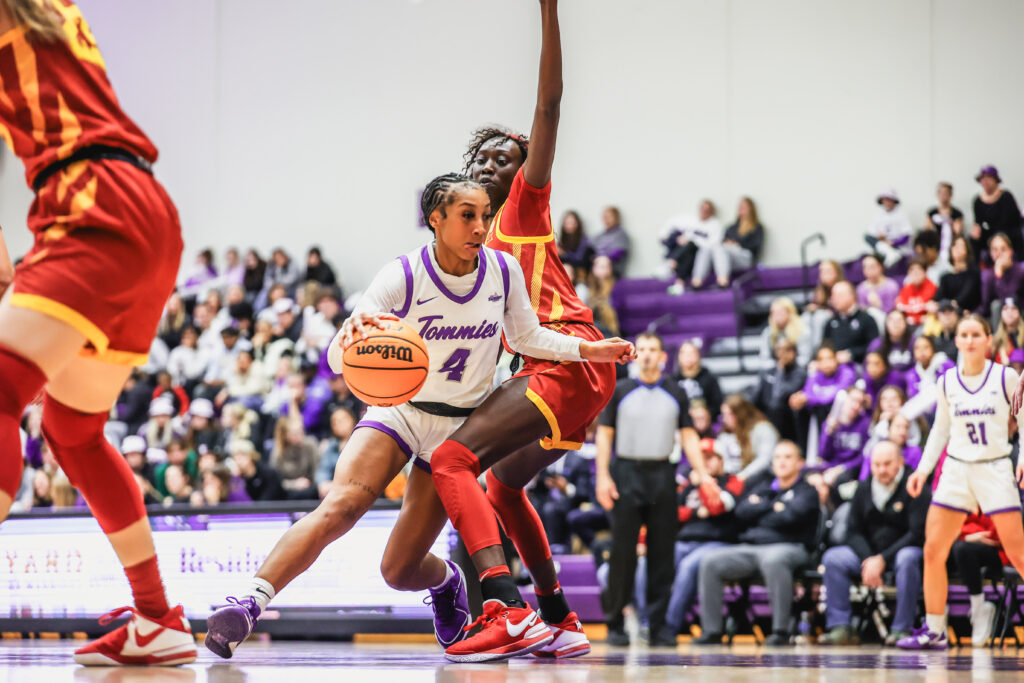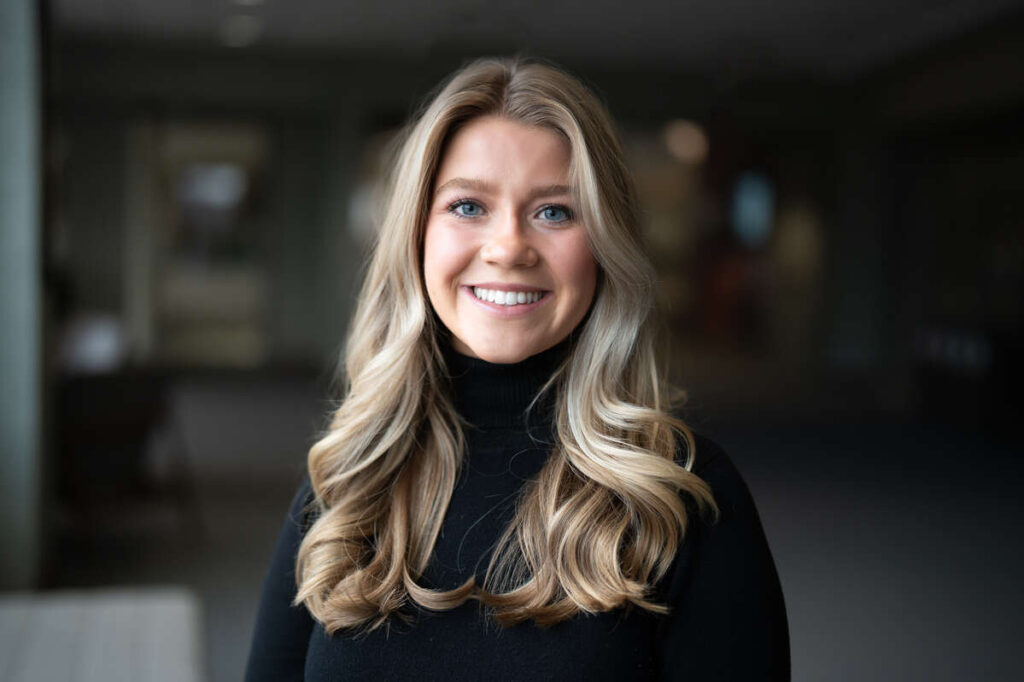“I feel like I’m getting a backstage tour,” I joked as Talia Nadir led me past the “Staff only” sign of O’Shaughnessy-Frey Library.
“You kind of are,” she quipped back as we twisted up a staircase to the librarians’ offices. Nadir is one of the research and instruction librarians here at St. Thomas, and I couldn’t help but scope out her office as she cleared off some space on her desk: walls covered with drawings from and pictures of her sons, Roxane Gay’s (who had recently spoken at St. Thomas) book topping a stack to my left and a pile of research papers for classes beside her computer on the other side of the desk.
A self-described “rebel,” Nadir was raised in a kibbutz – a Jewish commune in Israel, which are typically farms – and served in the Israeli army. Afterward, a global trip with a then-boyfriend brought her to Minnesota, where she has put down some roots of her own, including supporting the departments of Communication and Journalism, English, American Culture and Difference, Film Studies, Family Studies, and Justice and Peace Studies since her arrival at St. Thomas in 1996.
She frankly discussed what it was like growing up in Israel, how a global awareness and love of traveling influences raising three teenage sons, and why people need to stop assuming that librarians just organize and shelf books. Her advice to the St. Thomas community is to embrace all the resources librarians can bring to a students' education – and to try and make connections with different people and communities.
What was it like growing up in Israel?
My childhood was very, very different from anything Americans can relate to, probably. Even my kids are trying to figure out what the heck that was all about. [The kibbutz] really was kind of like a social experiment, people would say.
I call [the kibbutz] a greenhouse. Literally, the kibbutz is a very green space on almost every level. Everyone has gardens and takes care of their little places. It’s beautiful, and it’s peaceful. It’s totally the embodiment of “it takes a village.” It was very homogenous.
After high school, it’s mandatory to serve in the army. Women serve two years, so I served two years in the Israeli army.
You meet people from all walks of life. You’re forced out of this greenhouse. Literally, it was a shock to the system. I was a bit terrified at the people that I met and the kind [that were] disrespectful or really loud and not always very civil. On Friday and Saturday, [you would go] out of your army base to go home for a little break. [I remember one Friday] we were punished because two girls were really naughty, and we were all paying for it. It was all for one and one for all, whether you were in it or not. And the whole system, it’s very male chauvinistic.
I’m kind of a rebel, so it was really difficult to start taking orders. You have no option to question anything. You do what you’re told to do.
I never liked it, but it taught me a lot. In retrospect, things are always a little better, right? I know that without it, my worldview wouldn’t probably have been shaped the same way it is now. It helped me see things that I wasn’t aware of. Yes, I had to use an Uzi, and learn to shoot an Uzi, and learn to clean out an Uzi. My boys think it’s really amusing that Mom was a sergeant in the army.
How does culture awareness affect how you’ve raised your sons?
A lot. They know, of course, about my upbringing and that it was different, and that Mom is from a different culture. They know [my husband and I] grew up in very different environments. He is from a Catholic family. I’m Jewish, and I’m a daughter of a Holocaust survivor. Judaism is important to me even though [for me] it’s more about the culture than the religion.
I want them to be very aware of the world around them. It’s interesting because that became a big issue when my oldest applied to college, and he said that, to him, when he wrote his applications, the fact that he grew up in a multicultural home broadened his worldview.
Americans like to think, generally speaking, in black and white. And I always tell my kids, and I will have and continue to say, there are a lot of shades of grey. I want them to be aware of that and always question things, and not to just expect things to be simple. Because nothing really is.
So, to be very open, to be mindful, to be respectful, but to question things and not just take things for granted. That, for me, is huge.
Have your sons traveled to Israel?
Traveling is something I love doing, and I just wish I had a lot of money to do it! I’ve taken my oldest sons to Israel twice. One has been with me alone one time, so three times [for him]. My dream is to take [my youngest son] next.
My [oldest] son was saying, in his [college] application, that being in Israel changed his perspective and broadened his thinking. It changed the way he looks at the Israeli-Palestinian issue. Because you get to see it up close: a different country and a different culture, or trying different foods or trying different transportation, talking to people who have different life experiences.
Where are some of your favorite places you've traveled?
Probably the best place I’ve ever gone to is Greece. That was a long time ago, but that is something I hope to repeat.
Seriously, Greece is beautiful. We got to travel everywhere. The islands. Athens. Meteora – the mountains. They have these big mountains – with old monasteries. It’s incredible! Everything, from the beaches to the taverns to the mountains, incredible! Incredible. Most beautiful country ever.
If you could pick anywhere you haven’t gone, where would you go?
I’d like to do a root-searching trip in Germany. That’s been a dream. I’m very curious about Berlin. When in Germany, I’d like to go and see where my parents grew up, and combine that with Italy, France and, really, any place I can go!
What are you day-to-day activities as a St. Thomas librarian?
When I start a library session, I begin by asking students what they think librarians do. Probably 80 percent of the time, [they think] you either arrange, sort or shelve books. But it’s not just students who don’t know what we do. We find it’s true with some faculty, too, and even more broadly. The public image of a librarian has got to be dispelled!
I don’t know if I have a typical day. Because I do so many library instruction sessions, some days I may have one, two or even three library sessions, [which are either] 65 or 90 minutes, where I talk about how to do research and what are good resources. I would say that most of my days are devoted to preparing instruction sessions. I tailor everything to the specific classes I do. So I have to study everything the students do [in my departments’] classes – and every one of those has different topics and different requirements.
Not every day, but once a week at least, I look at book orders. I try to decide what books we need to buy to support the curriculum I’m responsible for. [I also evaluate and assess] electronic resources, which I think people have no clue that we do.
[I] communicate with professors [because] I would like my role to be [as] a partner in a student’s education. We add something valuable, and [too many] students are not aware of the fact that they have so many resources available to them. And they pay for it; they pay a lot of money.
It’s extremely rewarding when students say, ‘This was great. This was really helpful.’ It just makes your day, because you know you’ve done something good. I’m all about empowering students. I want students to know that we’re here to help them. We’re not going to do the research for them. But we’re so happy to help. For me, sitting with students, one on one, and thinking together about the research, trying different search strategies and just talking about their topic is probably the most rewarding part of any day. To see those wheels turning, and have things clicking, and realize that this is going to make an impact beyond this paper.
What is your favorite book?
One of my all-time favorites that I’ve recommended to a lot of people is Disgrace by J.M. Coetzee. If you are a reader and if you have any time to read, it breaks your heart. It’s so well written.
I really like Zadie Smith, On Beauty. One of my favorite in the last few years was Crossing to Safety by Wallace Stegner. My Year of Meats is also another really interesting book I recommend.
My entire family on my dad’s side were book people. So my favorite packages from my dad when he was still alive, coming from Israel, were contemporary Israeli novels with chocolate. The best combination you can give me is good books and chocolate. It’s about as euphoric as it’s going to get.
